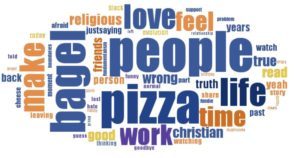J. Timothy King's Blog
March 28, 2018
How to Cheep in Many Programming Languages
 http://sd.jtimothyking.com/wp-content/uploads/2018/03/More_chicks-768x11… 768w, http://sd.jtimothyking.com/wp-content/uploads/2018/03/More_chicks-673x10… 673w, http://sd.jtimothyking.com/wp-content/uploads/2018/03/More_chicks-158x24… 158w” sizes=”(max-width: 197px) 100vw, 197px” />
http://sd.jtimothyking.com/wp-content/uploads/2018/03/More_chicks-768x11… 768w, http://sd.jtimothyking.com/wp-content/uploads/2018/03/More_chicks-673x10… 673w, http://sd.jtimothyking.com/wp-content/uploads/2018/03/More_chicks-158x24… 158w” sizes=”(max-width: 197px) 100vw, 197px” />
I have a small problem.
The first part of the problem is that I’ve been a Perl developer for the past decade—
That came out wrong. Let me start again.
I have a small problem.
The first part of the problem is that I’ve been enjoying Modern Perl for the past decade while not learning any other programming languages. Don’t get me wrong: I love Perl, and I love programming, and I love learning new things. But since 2006, I’ve mostly been focusing on personal growth.
I’ve been trying new things. I learned to write. (At least I believe I did.) I studied psychology, philosophy, and religion. I sank into a van-Gogh-sized depression and didn’t know why, clawed my way out of that into paralyzing anxiety and boredom, lost almost all of my friends, discovered psychotherapy, made new friends. I learned how to be a father and lover, and am now learning how to be a mentor to two young adults and how to be single. I tried my hand at being an indie author for a while, which earned me just enough money to double the loose change I found under the cushions of my couch.
In the end, that wasn’t really about money. None of it was. It was about rediscovering myself, or maybe discovering myself for the first time— That’s a story I’ll no doubt tell on my personal blog, which I believe currently has a readership of my parents plus three random strangers who stumbled onto the site by accident, and I may have pissed off my parents.
Anyhow, the bottom line is that the list of programming languages in which I feign expertise is a little out of date, and I’ve been working hard at expanding it. I’ve taken a liking to Python—a low-hanging fruit for a Perl expert, which I’m sure upsets both Perl and Python devotees. I’m falling in love with Django (and that’s not an exaggeration of how I’m feeling about it). I’m intrigued by Dart and Go and should refresh my Java skills. I’d also like to do something substantive with Perl 6, and although I know JavaScript, I’d like to play with Angular, React, and Node. And AngularDart! All of these are on my short list.
The second part of the problem is that all programming languages are the same. Boring. Okay, let me backpedal a step. Yes, there are differences, and sometimes those differences even matter.
For example, you’ll note that I did not mention PHP anywhere, not among the languages I’ve used nor among the languages I’d like to use. At this point, I need to confess, I’ve been dishonest by omission. I’ve probably done as much PHP development as I have JavaScript. But PHP is one of the worst programming languages ever invented. It’s right up there with Brainfuck, except that no one has ever even attempted to develop an enterprise CMS in Brainfuck. PHP is the lowest common denominator of programming languages. It’s a broad path among a variety of narrow gates. PHP makes it easy for amateurs to start down the road to implementing bugs. The plethora of PHP web systems out there is the bane of my professional existence. [1]
So language design does matter. But I think in practice it matters a lot less than many people seem to believe it does. And most of what matters is preference and prejudice born of personal experience. Once you elevate your code above beginning PHP, naïve JavaScript (the not-Good Parts), and 1990’s-era Perl (the kind used in 10,000-line CGI scripts), the differences become more nuanced. Language wars are a notch below sexism and racism: the category differences are minor or may not even actually exist, and they’re some of the most significant factors in our choices.
And in that realm of programming languages and practices… Boring. I really don’t need to learn a dozen different ways to print “Hello, World!” To me, that’s about as engaging as sexing chicks. (Hence the title of and photo at the head of this blog post.)
I need interesting challenges to tackle. And this is the third part of the problem. Or just a (single, solitary) interesting challenge to tackle umpteen times, although I can also imagine that becoming boring. [2]
 http://sd.jtimothyking.com/wp-content/uploads/2018/03/Another-technical-… 768w, http://sd.jtimothyking.com/wp-content/uploads/2018/03/Another-technical-… 1024w, http://sd.jtimothyking.com/wp-content/uploads/2018/03/Another-technical-… 320w, http://sd.jtimothyking.com/wp-content/uploads/2018/03/Another-technical-… 1200w” sizes=”(max-width: 300px) 100vw, 300px” />
http://sd.jtimothyking.com/wp-content/uploads/2018/03/Another-technical-… 768w, http://sd.jtimothyking.com/wp-content/uploads/2018/03/Another-technical-… 1024w, http://sd.jtimothyking.com/wp-content/uploads/2018/03/Another-technical-… 320w, http://sd.jtimothyking.com/wp-content/uploads/2018/03/Another-technical-… 1200w” sizes=”(max-width: 300px) 100vw, 300px” />
“Another technical journal, Scotty?”
“Ay.”
“Don’t you ever relax?”
“I am relaxin’.”
I think this is part of my personality. I’ve heard that there are people who can pick up a list of to-do items and just do them, in priority order, until each one has been checked off. I think I may have even worked with a team lead who was like that. He and I did not get along too well, and this personality difference may have been a contributing factor.
In any case, I need to find a motivator, some aspect of the task that sparks my interest, or else I simply can’t focus. My eyes glaze over, and my mind leaves, goes somewhere else—anywhere else that’s more interesting.
If I have a task to do, it helps if I remind myself of the significance of the task. Why I’m doing this is sometimes more important that what I’m doing. It also helps if I’m working with another person, especially if we’re pairing on the task. But more than anything else, it helps if I can choose the characteristics of the project such that working on it helps to meet my emotional needs.
I’ve been going over the qualities of such projects. Here are some that I’ve considered:
It should challenge me intellectually. It should be complex enough that I need to figure out how it works. At the end of the day, I should feel like I’ve accomplished something new. That probably means it shouldn’t be something I’ve done exactly before, although it can be a variation on a thing done before. It’s possible that implementing the same solution in a different programming language or framework might be a different enough variation to hold my interest, if the problem has enough moving parts and interactions.
It should give me choices to make. This is related to the point above, but it targets a different need. I want to have some control over the solution. If I’m just following a script, that’s a tutorial, not a programming project; it’s a rote exercise, and the choices have been made for me to start with. Part of what I love about being a software developer is that I get to create a solution that in some measure expresses who I am.
It should be something that others can also understand. I want bragging rights. I want to be able to publish a post here sharing the fascinating intricacies of the problem and how significant it is. And I want average Joe programmer to immediately grok why I find it fascinating and significant. I don’t just want to be heard, for example, by those who (like me) find behavioral economics fascinating or those who (like me) would totally read a scholarly dissertation on machine learning using neural networks, just for the fun of it.
It should be a problem that others are also working on. No, more than that. It should help establish a sense of community. This happens when, for example, I contribute to an already-existing open-source project. I’ve been a little disheartened by the high barrier to entry and low process quality of many such projects. (That’s a different post.) However, there are a few I have my eye on, to contribute to interesting open-source projects that use technologies that I’m not currently familiar with.
It should make the world a better place. I’m not talking about eliminating world hunger or curing cancer—although those would be great. But I would like to feel like I am part of society’s solution, not part the problem. Part of this is living within my integrity, within my values. The other part is making a difference. This does not need to be a purpose of the software itself, just part of my overall goal in working on the software. And it doesn’t have to be a grandiose purpose. The purpose could be as simple as making code beautiful again or spreading the gospel of test-driven development.
As I was writing out these bullet points, I realized that these are exactly the qualities I want—or need to make—in a paying job as well.
I apologize for the unexpected turn this post took. When I started, I intended to ask for suggestions of programming problems that might excite me. Now I see that the issue goes much deeper than just finding a fun set of things to work on.
(That’s been my life for the past several years, unexpected turns. I should be used to it by now.)
I’m going to leave that unexpected shift in the blog post, unedited.
And I’m going to start making fun and meaning in my day.
Still typing…
And may all your bars turn from red to green.
Tim
[1] That said, I could imagine a development organization that has processes to patch PHP the same way we patch JavaScript and Perl, by assuring that we’re only using the Good Parts and using idioms and practices that help protect us should we accidentally step on a programming landmine. It stretches my imagination, but yeah, I could imagine it.
[2] One might argue that learning all the exceptions to the exceptions to the rules of a language is what makes learning new programming languages intrinsically interesting. And while I can understand why someone might feel that way, that someone would not be me. I am of the mind that good programming languages have a relatively small set of orthogonal rules. If I have to learn a long list of exceptions to the rules and exceptions to the exceptions to the rules, that feels frustrating, not interesting. This is one the issues I have with some Perl code, honestly, and why I think we find that, in production, we use idioms that restrict the expressiveness of our code, in favor of clarity.
March 23, 2018
Five Harmful Religious Ideas I Had to Unlearn about Sex
This post originally appeared two years ago on Removing the Fig Leaf.
 http://blog.jtimothyking.com/wp-content/uploads/2018/03/Low_back_pain-76… 768w, http://blog.jtimothyking.com/wp-content/uploads/2018/03/Low_back_pain-10… 1024w, http://blog.jtimothyking.com/wp-content/uploads/2018/03/Low_back_pain-41… 411w” sizes=”(max-width: 300px) 100vw, 300px” />
http://blog.jtimothyking.com/wp-content/uploads/2018/03/Low_back_pain-76… 768w, http://blog.jtimothyking.com/wp-content/uploads/2018/03/Low_back_pain-10… 1024w, http://blog.jtimothyking.com/wp-content/uploads/2018/03/Low_back_pain-41… 411w” sizes=”(max-width: 300px) 100vw, 300px” />Original image by Harry Gouvas on WikiMedia.
I was born a Pentecostal.
My background was not as extreme as Kim Davis’s Pentecostalism, but I did grow up on Jimmy Swaggart and “That Thing” and homophobia and overt misogyny and stories of demon sex spirits imprinting pornographic images on my mind and shoving me into a pit of fornication and adultery and infidelity and shame and misery— But I’m jumping ahead.
More progressive religions—UU, Reform Judaism, Buddhism—don’t necessarily have these problems. But I didn’t grow up in any of those traditions.
When I lash out, I’m lashing out at the person I used to be, at the stories I tell myself about me and my own sexuality. I hate those stories. My life improves every time I leave another behind.
Sex is shameful.
I don’t remember anyone actually coming up to me and saying, “Sex is shameful.”
I only remember the hushed tones.
I remember being shielded from depictions of nudity.
I remember not talking to my parents about sex, and them not talking to me.
Sexual desire was a passion of the flesh. “Do not conform to the pattern of this world, but be transformed by the renewing of your mind.” (Romans 12:2)
I guess sex itself was not shameful, as long as you conformed to the religion’s expectations. In particular, anyone who had sex before they were married was committing sin and playing with fire. And after the wedding, sex was a given.
I never learned how to negotiate for sex. Not even with my spouse. Negotiating for sex would require talking about it.
This was not the only reason I lacked relationship skills. But it was part of it, and this feeling of inner shame would come back to bite me repeatedly.
Sex is holy.
When I was 11 or 12, I read a book about sex from a church library. It presented the subject tastefully, from a Christian perspective.
I learned that a man and woman get into bed together, usually naked— That shocked me; I couldn’t imagine being that exposed. And after they very clinically execute coitus, they end up feeling kinda sparkly all over. And that’s how it works.
I also learned that some Christians think masturbation is sinful, and others think it’s okay. I decided then and there that I would not touch myself in that way, just in case.
It didn’t work.
For years, I cycled through feelings of guilt and shame over this. Sometimes, I would cry and pray to my god to help me overcome this sin. I renewed my dedication to live a pure life. And that would last, maybe, for a few days.
Decades later, I finally decided that if sex with myself hasn’t ruined my life yet, it’s probably not going to.
Sex is scary.
I lost my virginity to a slut.
Throughout my adolescence and into young adulthood, I managed to avoid that kind of girl. But eventually, I fell to her temptation, her attentions, her fiery red hair, her curvy swagger, her alluring smile.
Tracy and I were about the same age, but she had a baby daughter, while I was almost just out of diapers. (“Tracy” is not her real name.)
We didn’t have intercourse, and I counted my blessings. I had narrowly escaped a woman who was sex-obsessed, skin-deep, mixed-up, and dysfunctional. A woman gives up part of herself when she has extramarital sex. How screwed up must Tracy have been inside? I never went out with her again.
In reality, the opposite was probably true. I would have destroyed her life. I had never learned how to have a real, adult relationship, the kind that does not fit into the moralistic box that the god of dogma has prepared for his children.
But what we did was sex. And our moments together I so enjoyed. For decades afterward, I would remember dating to be a loathsome duty of youth… except when it came to Tracy. She made dating fun. Exuberant sometimes. Passionate. Comfortable. Happy.
I didn’t know how to give her credit for that.
Far from heaping shame on her, I am the one who should be ashamed, because I do not even remember her last name.
Sex is a commitment.
My longings I held firmly in check with dogma. No wonder I was so miserable.
My marriage was my best shot at happiness. If I got “too close” to another, I was risking it. “Talking leads to flirting, and flirting leads to cheating,” words I’ve heard. I squelched promising friendships, never expressed the tenderness or passion that was in my heart, pretended my life was good.
And I was incredibly lonely.
I so desired connection, variety, creativity, exploration, so desired to fall in love again. And as I grew older, I realized the experiences that had been denied to me when I was young, and I wanted some of those experiences.
Once, in the middle of a particularly deep depression, I was lying on the living room couch daydreaming and feeling lonely. I knew that the only way for me to get what I wanted was for my wife to die. I realized, she would probably outlive me. And in that moment, I gave up on love. And I rolled over and curled up into a ball and began to sob. I think I cried myself to sleep.
Meeting local polyamorists changed everything. They proved that happiness exists outside of religious monogamy. It felt like finally coming home. Being poly to me means not being afraid of myself. It means not being afraid of loving others. Being poly to me means reconnecting with the real me that was hidden beneath all the religious sanctity.
And the irony is that now my commitments strike more deeply, because I now get to choose the commitments I make.
Sex is offensive.
I could see the end coming from afar, but I didn’t see how fast it would collide with me.
I had already talked to the church leadership about stepping back from my role as music leader, in order to discover my beliefs and values, and they expressed their sympathy and support. I figured I would eventually drift away from them, if that’s where I was destined, and quietly fade from view.
My final performance there was wonderful. The denomination had asked our church to bring our worship service to the national conference. So we packed up our gear and headed to Chicago for a summer weekend. I didn’t believe any of the theology anymore, but that many people all singing together was an experience of pure beauty.
The following week, I was captivated by one of the conference photos from the denomination’s public Facebook page. It was a photo of the morning worship service, from the back of the room, with hundreds of people there, and us on the stage off in the distance. I shared this photo and added a caption:
“Performing before a room this big is almost as fulfilling as sex.”
I was not trying to push people’s buttons, to tick them off, to cull my Facebook friends list. I was merely describing a deep, personal, emotional experience. It is as honest and vulnerable a statement as you are ever likely to see me make publicly.
And immediately, people started calling the head clergy. Within hours, he was chewing me out over the phone and demanded that I censor my Facebook feed, so as not to be divisive, for the sake of peace in the congregation. I decided instead to withdraw my membership.
That broke me. I was an atheist before, but this turned me into an angry atheist. They told me they were my friends, and just when I most needed their understanding and support, they abandoned me and betrayed me.
Still, in the ashes of that destruction, new life has sprung. Still young, tender, a delicate shoot, it promises a miracle. For the first time in my life, I feel hopeful. Not depressed, but fulfilled. Not lonely, but loved—deeply, truly, passionately (as my lover might put it). I still climb hills and traverse valleys, and sometimes the valleys are darker than I ever imagined, and way more complicated. But they’re my valleys, and I cherish them. That’s part of growing up, part of being an adult.
And I will never go back.




March 16, 2018
The Turn That Saved My Life
 http://blog.jtimothyking.com/wp-content/uploads/2018/02/Ghar-Mountain-DV… 768w, http://blog.jtimothyking.com/wp-content/uploads/2018/02/Ghar-Mountain-DV… 681w, http://blog.jtimothyking.com/wp-content/uploads/2018/02/Ghar-Mountain-DV… 160w, http://blog.jtimothyking.com/wp-content/uploads/2018/02/Ghar-Mountain-DV… 1557w” sizes=”(max-width: 200px) 100vw, 200px” />
http://blog.jtimothyking.com/wp-content/uploads/2018/02/Ghar-Mountain-DV… 768w, http://blog.jtimothyking.com/wp-content/uploads/2018/02/Ghar-Mountain-DV… 681w, http://blog.jtimothyking.com/wp-content/uploads/2018/02/Ghar-Mountain-DV… 160w, http://blog.jtimothyking.com/wp-content/uploads/2018/02/Ghar-Mountain-DV… 1557w” sizes=”(max-width: 200px) 100vw, 200px” />Master Sgt. Steve Horton, ISAF Joint Command, stands on top of “Ghar” Mountain, a 1500 ft. mountain on Kabul Military Training Center in Kabul, Afghanistan, Aug. 20, 2010.
“But I come here today to look across this world of threats to a world of peace. In that search we cannot expect any final triumph—for new problems will always arise. We cannot expect that all nations will adopt like systems—for conformity is the jailer of freedom and the enemy of growth. Nor can we expect to reach our goal by contrivance, by fiat or even by the wishes of all. But however close we sometimes seem to that dark and final abyss, let no man of peace and freedom despair. For he does not stand alone. If we all can persevere, if we can in every land and office look beyond our own shores and ambitions, then surely the age will dawn in which the strong are just and the weak secure and the peace preserved.” (John F. Kennedy, Address in New York City Before the General Assembly of the United Nations, September 25, 1961.)
Today is an anniversary of sorts. March 16, 2009, was the day that I discovered salvation and started digging out of
my big depression.
One of the reasons I’ve not been writing here over the past four years is that I’ve been processing. These last four years have represented a dramatic climax in my life, a climax that began with that discovery nine years ago. I’ve completely changed the way I look at religion and relationships. I’ve dropped my faith. My kids’ mom and I have parted ways. And I’ve finally been dealing with many of the family-of-origin issues that had been pressing on my mind. This is all good news. But all of it also dominates the thoughts and emotions, as I forge a new path through life’s jungle, leaving little time for blogging.
But another reason I’ve been silent is that I’ve been afraid to be genuine.
It’s time for that to end.
I have been increasingly sharing my story on my Facebook timeline, and most of those posts are public. But that’s always felt like a different space to me.
This blog is my public face, and I was afraid that if I published my true, raw thoughts here, I’d turn away followers, and that after I came through the change, I’d regret it. It’s the classic vulnerability trap: you need to open up in order to connect with others, but doing so exposes you to emotional risk.
Pretty silly, actually, as my posting frequency has been so low for the past four years. But when you’re in that space, it’s not about how objectively silly it is; it’s about how safe you feel. And when you’re story has just reached a dramatic climax in which you lost almost every friend you had, then yeah, you feel pretty unsafe.
There is so much I can write about. To start with, I can go through all of my old posts and write updates to them. I’ve started that project once or twice during the past few years, and I was surprised to discover that there’s very little that I would outright reject. But there are bits that I’d amend. And there’s so much that I did not originally say, but which I want to say.
But mostly, I want to tell my story.
I want to tell my story, because I never felt safe telling it before.
I want to tell my story, because I need practice validating myself.
I want to tell my story, because I need to remind myself that I need no one’s permission to own it.
I want to tell my story, because so many of my progressive friends don’t know what it’s like to live inside a fundamentalist family and religious community.
I want to tell my story, because telling our stories is the only way to truly connect with others.
I don’t like to make my entire story about my journey out of religion, but the truth is that it mostly is.
Facebook showed me one of my status updates from 9 years ago.
הודו ליי כי טוב כי לעולם חסדו
Thank the Lord, for He is good; his kindness is forever.
My, how perspectives change.
When I shared this nine years ago, I was going through a depression so deep I wanted to kill myself just to make the pain stop. And on that day, I discovered the work of psychologists Joe Griffin and Ivan Tyrrell. They suggested that maybe I was depressed because my emotional needs weren’t getting met.
At the time, this was a revolutionary thought for me, and I didn’t even realize it was happening. All I knew was that Griffin and Tyrrell had validated me, had validated my needs where my entire social circle had failed to do so. And I liked it. I needed it.
In the days and weeks that followed, I began being more aware my own needs, taking care of myself better, and doing kindnesses for myself. Psychologist Ross Rosenberg suggests that this is the first step to healing from what he calls Self-Love Deficit Disorder, and the first step to extricating yourself from an abusive relationship. For me, it was the first step on a journey in a better direction that allowed me to leave behind the Judeo-Christian religions and their narcissist god.
“Thank the Lord, for He is good; his kindness is forever.” This psalm we used to sing and recite in a dozen different forms, and I had memorized it in both English and Hebrew. But what is Yahweh’s “kindness,” really? At best, it is the random forces of nature, sometimes wonderful and sometimes horrible. It’s a kindness you can’t count on. This psalm is spiritual gaslighting. I know what kindness looks like, and it does not involve natural disasters, pediatric cancer, or emotional abuse.
I’ve become more comfortable accepting true kindness—especially from myself—rather than chanting the nonexistent kind in hope that this will somehow magically increase the happiness in my life. I learned that I was valuable, not because of what God had supposedly done for me—saving me from a fate that he was going to inflict on me—but I was valuable just because I was. And as I learned this, my spirit grew such that it could no longer fit within the oppressive theological box that my religious friends and family needed me to stay inside.
That’s why you’re likely to see many more religious posts. If you thought Richard Dawkins was an angry atheist, you ain’t seen nothin’ yet. And as Evangelical leaders justify their supremacism in the political and social spheres, you can expect me to comment on the role that Evangelical stories play in their extremism. You can expect to see terms like “divine negging” and “spiritual gaslighting.” And you can expect me to pull out religious stories, both the beautiful and the ugly, and present them unvarnished.




November 2, 2016
3 Romantic Bible Stories
 http://blog.jtimothyking.com/wp-content/uploads/2016/11/JvFuhrichJosephR… 768w, http://blog.jtimothyking.com/wp-content/uploads/2016/11/JvFuhrichJosephR… 1024w, http://blog.jtimothyking.com/wp-content/uploads/2016/11/JvFuhrichJosephR… 343w, http://blog.jtimothyking.com/wp-content/uploads/2016/11/JvFuhrichJosephR… 1215w” sizes=”(max-width: 300px) 100vw, 300px” />
http://blog.jtimothyking.com/wp-content/uploads/2016/11/JvFuhrichJosephR… 768w, http://blog.jtimothyking.com/wp-content/uploads/2016/11/JvFuhrichJosephR… 1024w, http://blog.jtimothyking.com/wp-content/uploads/2016/11/JvFuhrichJosephR… 343w, http://blog.jtimothyking.com/wp-content/uploads/2016/11/JvFuhrichJosephR… 1215w” sizes=”(max-width: 300px) 100vw, 300px” />Jacob Encountering Rachel with her Father’s Herds
Joseph von Führich (1800–1876)
[Source: WikiMedia]
Around Valentine’s Day, Facebook thought I might enjoy this HuffPost article, entitled “Romance in the Bible?”. (Question mark in original.) I once knew its author, back when I myself also worshipped the One True God. This is why Facebook thought I wanted to read it. As it turns out, I was interested, but not in the way that Facebook thought.
It reminded me of several Bible romance stories. And my own reaction to those stories shocked me. I grew up a Christian fundamentalist, and I know those stories inside and out, up and down, backwards and forward.
Yeah, I know. Many Christians, including Evangelicals like I was, have never actually read the Bible. But from a young age, I had. I started with The Picture Bible as a kid, and before I hit adolescence, I was reading through the good-ol’ King James. Eventually, I learned some Biblical Greek and Hebrew, and collected shelves of reference books. None of this disabused me of my faith, because you can always examine those stories through whatever lens you want to.
I now see through a different lens.
I no longer live trapped inside the fundie bubble. It no longer distorts my view in the same way. I see those stories from a different perspective. The Bible’s deity isn’t always the hero. The heathen isn’t always the villain.
Three stories in particular stuck out at me.
The “Rape” of Dinah
In this story from Genesis 34:1-31, a prince named Shechem falls in love with Jacob’s daughter Dinah, makes love to her, and wants to marry her. (That would make her a princess.) Jacob and his sons tell him, fine, you can marry her, but you have to be circumcised first. (Because that’s what the God of Abraham, Isaac, and Jacob convinced great-granddaddy Abraham to do.)
Shechem is so in love with Dinah, he agrees instantly. He convinces the entire city to cut off their foreskins. And three days later, while they are still all incapacitated in their tender parts, two of Dinah’s brothers attack and kill… Every. Single. Male. In the. Entire. City.
Their excuse: “Should he have treated our sister like a prostitute?”
They say that Shechem “raped” Dinah, but let’s be honest about “rape” in the Bible. The thoughts, rights, and consent of the woman don’t matter. We don’t know what Dinah thought and felt, because the Bible storyteller didn’t care. It wasn’t germane to his story. If Dinah refused, that would not have made it a “rape.” All we know is that Shechem didn’t ask Jacob’s permission first. His problem was that he hadn’t paid her pimp a proper cut. If he had, then he could have raped her all he wanted with impunity.
Enraging, yes. Shocking, maybe. And how romantic, that a man sacrifices the lives of himself and all of his countrymen, all for the love of a woman.
 http://blog.jtimothyking.com/wp-content/uploads/2016/11/Figures_Simeon_L… 157w, http://blog.jtimothyking.com/wp-content/uploads/2016/11/Figures_Simeon_L… 658w” sizes=”(max-width: 197px) 100vw, 197px” />
http://blog.jtimothyking.com/wp-content/uploads/2016/11/Figures_Simeon_L… 157w, http://blog.jtimothyking.com/wp-content/uploads/2016/11/Figures_Simeon_L… 658w” sizes=”(max-width: 197px) 100vw, 197px” />Simeon and Levi slay the Shechemites
Figures de la Bible (1728)
[Source: WikiMedia]
I’d never before seen the romance in that story. As a Christian fundie, I’d only seen sex and violence, crime and justice, and Israel’s supreme being’s all-holy demands and his all-powerful hand. Now, I see that all-encompassing passion the Greeks called eros, that bittersweet longing we call being in love. And I see lives and relationships brutally severed by the moralizations of a few dogmatic believers.
That used to be me. I used to be Shechem.
Leah and Rachel: Sister Wives
Jacob loved Rachel so much that he worked for seven years in order to buy her as his wife. (Genesis 29:16-35.)
Yes, buy. No matter how much Jacob and Rachel loved each other, he needed to negotiate with her father Laban. And Laban cheated him, pawned off Rachel’s older sister Leah. And I guess Jacob was so excited, he never even looked in her eyes. Or it was dark. Or something. In any case, having sealed the deed with Leah, Jacob agreed to work for seven more years for Rachel, too.
Yeah, I get it. Rachel is the young, pretty daughter. Leah is the old, ugly one. And Rachel is Jacob’s favorite. And everyone knows it.
As a polyamorist, I can tell you, this is not a formula for good metamour relations. Leah named her first son Reuben, which means “see, a son,” because, she said, “It is because the Lord has seen my misery. Surely my husband will love me now.”
Yeah, this is twenty different kinds of wrong.
This, they say, is just one example of why nonmonogamy can’t work.
But really the romance here is not Jacob’s, but Leah’s. Maybe she was trapped in a misogynous, patriarchal system. (She was.) But she still wanted the love of her husband. She wanted his attentions. She wanted to know she mattered to him. And she herself was not enough. She was not worth that on her own. So she tried to buy his love by giving him a son.
It breaks my heart.
As one pseudonymous poly writer put it: “I love the same person you love, though not ever in the same way. Never the same. I cannot quantify love: not mine; not yours; not anyone’s. I understand exquisitely, that when he is with me, he is not with you, and I am grateful that you are willing to gift me a portion of his time and attention. I know that isn’t always easy.”
I am always thankful to my metamours, who give up part of the time and attention of the ones they love, for me. And I am always thankful to my partners, for treating our relationship as unique and important and valuable, because I matter to them, and they matter to me.
Solomon’s One Fatal Weakness
King Solomon “loved many foreign women,” including “seven hundred wives of royal birth and three hundred concubines.” (1 Kings 11:1-13)
Talk about nonmonogamy, huh?
But more importantly, he was nonmonogamous with his divine ruler, who took most of his kingdom in the divorce.
 http://blog.jtimothyking.com/wp-content/uploads/2016/11/Albert_Joseph_Mo… 768w, http://blog.jtimothyking.com/wp-content/uploads/2016/11/Albert_Joseph_Mo… 535w, http://blog.jtimothyking.com/wp-content/uploads/2016/11/Albert_Joseph_Mo… 825w” sizes=”(max-width: 300px) 100vw, 300px” />
http://blog.jtimothyking.com/wp-content/uploads/2016/11/Albert_Joseph_Mo… 768w, http://blog.jtimothyking.com/wp-content/uploads/2016/11/Albert_Joseph_Mo… 535w, http://blog.jtimothyking.com/wp-content/uploads/2016/11/Albert_Joseph_Mo… 825w” sizes=”(max-width: 300px) 100vw, 300px” />The Shulamite (1864) – The Shulamite (of the Song of Songs) relating the glories of King Solomon to her maidens
Albert Joseph Moore (1848–1893)
[Source: WikiMedia]
He was the wisest man in the world (1 Kings 4:29-34). This is the guy who wrote not only Proverbs and Ecclesiastes but also the the Song of Songs, which is Solomon’s, the most romantic book in the entire Bible. And this was Solomon’s one fatal weakness, not that he loved so many women, but that his heart was moved to serve other gods by his passion for his wives.
This passion inspired him to write in the voice of his Beloved:
Awake, north wind,
and come, south wind!
Blow on my garden,
that its fragrance may spread everywhere.
Let my beloved come into his garden
and taste its choice fruits. (Song 4:16)
That is romantic, erotic, and sexy as hell.
No wonder Biblical literalists never read it too literally. This bit from the Christian History Institute rings all too familiar:
The early Christians found the Song just as odd and its sexual language just as problematic as we do. But they took its very strangeness as an invitation to seek out a deep and hidden spiritual message. They could find meaning within its shocking imagery because they made use of allegory.
They saw the Song of Songs as a metaphor for their belief in their favorite divine being, and for the spiritual monogamy that he demands.
Thing is, I don’t find its language problematic at all. Not strange, but marvelous. Not shocking; rather, it comforts me. That lover’s fantasy, to go down on a woman I love, it fills me with a warm excitement, and my mouth waters in anticipation. I feel her smooth skin, hear her soft singing, wrapped in her tender embrace.
“I so enjoy you.” She smiles.
“I love you.”




September 29, 2016
Living as Genuine Me
 http://blog.jtimothyking.com/wp-content/uploads/2016/09/Tims-most-used-w… 768w, http://blog.jtimothyking.com/wp-content/uploads/2016/09/Tims-most-used-w… 457w, http://blog.jtimothyking.com/wp-content/uploads/2016/09/Tims-most-used-w… 800w” sizes=”(max-width: 300px) 100vw, 300px” />
http://blog.jtimothyking.com/wp-content/uploads/2016/09/Tims-most-used-w… 768w, http://blog.jtimothyking.com/wp-content/uploads/2016/09/Tims-most-used-w… 457w, http://blog.jtimothyking.com/wp-content/uploads/2016/09/Tims-most-used-w… 800w” sizes=”(max-width: 300px) 100vw, 300px” />My most used words on Facebook (Sept 29, 2016)
Two years ago, on August 1, I wrote a page-long statement in my private journal, “Who Am I Today?” It contained paragraphs on religion, politics, personal values, sexuality, and personality. I was trying to sort through what I believed, how I identified, what I valued, what I felt and thought, to put this all into words.
Two years later, and I’m still trying to answer that question: Who am I today?
While I have a much better sense of the answer, with each new day, week, month, I’m discovering new things about myself. For the time being, I’m enjoying the journey, meeting new people, experiencing new things, stepping out of my comfort zone a little more, inventorying the pieces of life that stick to my personhood.
If you follow me on Facebook, you may have noticed that I’ve changed. Or at least my outward appearance has changed. And this post will probably reflect that change. The Me inside really hasn’t changed—a fact that showed clearly when I recently had dinner with an old friend from 25 years ago. But the freedom with which I allow that Me venture into the open has changed. He’s no longer caged up, no longer a prisoner in his own soul. More and more, he’s allowed to venture out and express himself without shame. He’s getting better at listening to the people around him, taking in the world. And more and more, he’s feeling more comfortable in his role as Me, and feeling more courageous, more able to set healthy boundaries, more able to stand on his own.
So who am I today?
I am an atheist. I don’t believe any god literally exists, and I don’t want to identify with any god that I’ve met.
I don’t believe in the god of Christian fundamentalism with whom I grew up. I don’t believe prayer does jack shit. I don’t believe in demons or angels, in heaven or hell.
I also believe that the stories we tell ourselves are more powerful to our minds than literal reality. And I think some stories are better than others.
That’s why I don’t believe in original sin, and I think that in the Biblical creation story, Eve was the hero. I think the god I grew up with is an abusive monster. He traps innocent souls by capturing them at their weakest and most vulnerable, bombarding them with his so-called good news: “You are worthless sinners. No one will ever love you, and you deserve nothing but torment. Aren’t you lucky you have me?”
This story is highly destructive. It’s manipulative and coercive. It displays a weak sense of personal boundaries and no working concept of consent. “Love” and “kindness” for this god does not mean supporting others in meeting their needs, in their separate journeys, does not mean empathizing or showing compassion, but rather means fixing others according to the dictates of dogma. I may not be an anti-theist, but I am an anti-fundamentalist.
At the end of the day, I don’t believe in much. But I do believe in the value of limitless love.
And I think that’s what my old religious acquaintances probably find scariest.
I am a social liberal and a political libertarian. I have a strong sense of personal boundaries, and I think that each of us is responsible for pursuing their own happiness. I believe the role of the state is to protect these rights, and I think that’s a complicated and broad enough mission that we’ll probably never quite figure out how to accomplish it.
When Evangelicals refer to gay people as “broken,” “sinners,” “those who are perishing,” that’s bigotry. I celebrated the day the Supreme Court of the US ruled that gay people can get married in any state, because gay relationships are just as valid as straight ones. I’m waiting for the day that plural marriage will also be an option, because nonmonogamous relationships are also just valid as monogamous ones.
Abortion is a profoundly difficult and personal choice, and I will never vilify anyone for choosing to abort a pregnancy or to carry it to term. But I do vilify those who force their judgment on others, especially through political action and unjust laws.
I believe the state should not interfere with a peaceful person’s individual choices, even if I disagree or disapprove of those choices, as long as they’re not violating the consent of another. I also think that once you drill down into that statement, you see it’s much more complex than many libertarians, especially objectivist libertarians, seem to recognize. But then again, I’m not an objectivist. I’m more utilitarian. But I also want to see good evidence—not platitudes or anecdotes, but good evidence—before I hand over the reigns of my life and the lives of others to a human being with power.
In general, I am skeptical of state action, and I get the sense that those on both the right and left are too quick to believe in it, when politicians make promises that appeal to their hearts. I think reality is more complicated than “There ought’a be a law.”
I am a straight, white, male, sex-positive, feminist, polyamorous slut.
I think I’ll leave that line in a paragraph by itself.
I came out as polyamorous on Facebook on February 1, 2016.
Since then, my polycule map has changed significantly. I am now single, though still close friends with many of the people from the original diagram, plus others. But I still identify as solo poly. Whether I am by myself, in a relationship with one person, or in many relationships (for some definition of “relationship”), I will I think always be poly.
I have a beef to pick with mononormativity—and I see mononormativity as the opposite of polyamory. Part of my beef is that I’m bitter from my experiences with religious monogamy. Forcing someone into an exclusive relationship is as wrong as forcing them to join a harem or wear a burqa. (That’s a swipe at the Evangelical pot calling the Islamic kettle black.) The other part of my beef with mononormativity is that it’s just plain broken. We need a consent-based relationship ethic, which I also see as a key poly value.
I see sex as beautiful and wonderful and fun. I link sex to its wonderful feelings, and think about the wonderful things I associate with it. I feel comfortable talking about sex. I want to be honest about sex, with my kids, with my partners, with myself.
And I enjoy sex. I enjoy everything about sex: the taste of skin, the smell of excitement, the feel of pubic hair against fingertips, the sound of breathing, moaning, screaming, the feeling of skin against skin, the shape of body parts. And I see this experience as an expression of affection and excitement.
I am passionate, authentic, an outgoing introvert. I love parties, love meeting people and sharing stories, love exploring thoughts and feelings, love excitement, and retreat into my own quiet to recharge.
I thrive on one-on-one interaction. Even at a party, you’ll see me circulating into and out of deep conversations with one or maybe two others. I hate small talk. I’m as transparent as cellophane, and I appreciate the same from others. I most enjoy even exchanges. My best friends share with me as much as I share with them, and depend on me as much as I depend on them.
If you watch certain movies with me, you’ll see me cry. And I like it that way. I prefer honesty in relationships and in life. I do not believe in manipulating others.
I do not live in the closet. It’s cramped in there. And I do not like to pretend to be someone I’m not. It’s simply no fun.
I grieve every relationship transition, losing a friend or a lover. When I love someone—even a friend—for just a moment that person becomes the most important thing in my life. An afternoon with someone can keep me smiling for the whole rest of the day. And a day with the right person can keep me smiling for a week. The people in my life give it meaning and purpose.
This is the person I am, and the person I want to be.
This is the person I am, and the person I want to be.




March 25, 2016
The “Good” about Friday
![Christ on the Cross, Giovanni Battista Tiepolo [Source: WikiMedia]](https://i.gr-assets.com/images/S/compressed.photo.goodreads.com/hostedimages/1459000522i/18558848.jpg) http://blog.jtimothyking.com/wp-content/uploads/2016/03/Giambattista_Tie… 268w, http://blog.jtimothyking.com/wp-content/uploads/2016/03/Giambattista_Tie… 600w” sizes=”(max-width: 300px) 100vw, 300px” />
http://blog.jtimothyking.com/wp-content/uploads/2016/03/Giambattista_Tie… 268w, http://blog.jtimothyking.com/wp-content/uploads/2016/03/Giambattista_Tie… 600w” sizes=”(max-width: 300px) 100vw, 300px” />Christ on the Cross, Giovanni Battista Tiepolo
[Source: WikiMedia]
I grew up in a shame-and-blame religion.
The so-called Good News, as taught to me, is that we humans are fundamentally evil, unholy, sinners, distant from God. And so to save us, God needed to execute the perfect blood sacrifice. And there was only one person perfect enough to serve as that sacrifice, God himself. So he came to Earth in the form of a man who was without sin, and allowed himself to be executed, the perfect scapegoat, in order to take upon himself the sins of us all. As a result, we can blame him for all the shame we feel about who we are.
When I’ve told this story, I have gotten shocked looks of disbelief. “That’s not what Christianity is about, is it? I thought it was a religion of love and peace and helping people.”
But I grew up in fundamentalist Christianity. I grew up an Evangelical. I grew up on Jimmy Swaggart and James Dobson and patriarchy and homophobia and the Holy Spirit über alles. And I grew up singing classic Evangelical hymns and praise & worship songs.
You may have heard the song Amazing Grace:
Amazing grace how sweet the sound
That saved a wretch like me.
I once was lost but now am found,
Was blind but now I see.
Examine those lyrics. This is not just an expression of grief, a cry for help. This is not even a poetic boast that my life has improved. Rather, this is the first-person equivalent of “When did you stop beating your wife?”
This meme appears sometimes hidden in the most insidious of places, in what was one of my favorite modern praise and worship tunes, Cannons, by Phil Wickham (emphasis added):
You are holy, great and mighty,
The moon and the stars declare who You are.
I’m so unworthy, but still You love me.
Forever my heart will sing of how great You are.
Herein is an idea that seems to confound people who have never been caught in the Evangelical web. This worldview can say, “Hate the sin, and love the sinner,” because its definition of love includes being told that you are broken and worthless. But it’s okay, it reassures you, because its god magically changes who you are to conform to the dogma, as in a verse from Mighty to Save by Reuben Morgan:
So take me as you find me,
All my fears and failures.
Fill my life again.
I give my life to follow;
Everything I believe in
Now I surrender.
This is a common meme in fundamentalist Christianity. It wasn’t just that I was feeling shitty and looking for emotional support. Rather, the theology itself taught me that I was worthless. And once I accepted that premise, I could dump that inner shame on Jesus, along with everything I think and everything I am, all my worthless shit. (No owning your own shit here.) In return, I receive a deeper theological conviction, deeper answers, a deeper connection to my god, including to the idea that I’m worthless.
I had no intrinsic value as a human being. My only value was whatever that amazing grace bestowed on me, and that came from outside of me, completely undeserved. I was responsible for my god’s loathing of me, and I was only rescued because he controlled my life.
Can you say, “healthy boundaries”? I couldn’t. (But that’s a different story.)
 http://blog.jtimothyking.com/wp-content/uploads/2016/03/Jimmy-Swaggart-6… 632w, http://blog.jtimothyking.com/wp-content/uploads/2016/03/Jimmy-Swaggart.j… 658w” sizes=”(max-width: 300px) 100vw, 300px” />
http://blog.jtimothyking.com/wp-content/uploads/2016/03/Jimmy-Swaggart-6… 632w, http://blog.jtimothyking.com/wp-content/uploads/2016/03/Jimmy-Swaggart.j… 658w” sizes=”(max-width: 300px) 100vw, 300px” />
Jimmy Swaggart was big when I was a teenager. He was responsible for a lot of the fear and shame I developed in connection with sex. This was just before he was caught with a prostitute in 1988, resulting in him losing his Assemblies of God credentials.
Not too long ago, I was wondering what he was up to, and thanks to YouTube, I found a 10-minute video of him and his worship team performing Andraé Crouch’s “I Don’t Know Why” and “Through It All.” Listening to these classic lyrics feels almost comical. And also horribly tragic.
I don’t know why Jesus loved me.
I don’t know why He cared.
I don’t know why He sacrificed His life.
Oh, but I’m glad, so glad He did.
And:
I’ve had many tears and sorrows.
I’ve had questions for tomorrow.
There’s been times I didn’t know right from wrong.
But in every situation,
God gave me blessed consolation
That my trials come to only make me strong.
Then Swaggart went into a speech about how Jesus is with you even in the worst of times.
And all I could think of was, he didn’t actually do anything all that bad. So he hired a prostitute to pose for some naked pictures, or whatever it was. The worst part was that Frances presumably didn’t know about what was going on. But she’s still with him. Was she coerced to stay in an abusive relationship? (In fundamentalist Christianity, that’s a real possibility.)
Instead of escaping the oppression of his dogma, he doubled down on it. He had to. He had no real choice. Whether or not Frances was coerced by the theology into staying in a relationship that didn’t benefit her, I’m pretty sure he is being coerced into a divine relationship that doesn’t benefit him. And he has turned around—like Josh Duggar—and coerced others into the same relationship. For fun and profit.
And then I ran across a video of Swaggart’s song, “Wasted Years”:
Wasted years, wasted years, oh how foolish,
As you walk on in darkness and fear.
“Turn around, turn around,” God is calling.
He’s calling you from a life of wasted years.
As you wandered along on life’s pathway,
Have you lived without love, a life of fear?
Have you searched for life’s hidden meaning?
Or is your life filled with long wasted years?
Search for wisdom, and seek understanding.
There is someone who knows and always hears.
Give it up! Give it up! The load you’re bearing!
You can’t go on in a life of wasted years.
This is exactly how I feel, having wasted most of my life trapped in Swaggart’s own brand of divine repression. I was born into the Pentecostal mindset. And I walked in the darkness and fear of this mindset, the fundie bubble, “protected” from the real world by dozens of emotional defense mechanisms, carefully cultivated in me from the time I was a young boy.
So I listen to Jimmy Swaggart sing this song, and I hear him talking about a god that has called me out of Evangelicalism into a place where I can truly be wholehearted (to steal Brené Brown’s word).
Many of my fellow atheists like to mock the Evangelical narrative. They say it makes no logical sense, for a god to kill himself as punishment he himself metes out for a sin he designed into us. But when told from a metaphorical perspective, from a psychological perspective, it makes all the sense in the world. It’s a story about defending against feelings of shame by projecting them into someone else.
That we would actually tell this story as a healthy model on which to build our lives is so incredibly dysfunctional, I can’t begin to describe it. I’m reeling from the fact that I not only believed this narrative but let it control my life for so many years. And now I think I’m dealing with the realization that I’m way more screwed up than I thought I was.
The religion itself created those feelings of shame. And it gave a way out which did not actually help me process the feelings, but only to project them into an outside scapegoat. I never learned to own my own identity, because my identity was located in my god. And I was addicted, in a way, to this pattern of shame, trapped in a system which had made me very unhappy and in which I ultimately did not even believe.
To this day, I continue to wrestle with the fallout from living in this world. The dogma runs deep.
For the moment, I’m still an angry atheist. When I lash out, I’m lashing out at the person I used to be, at the stories I tell myself about me and who I am. I hate those stories. My life improves every time I leave another behind.




March 24, 2016
Mourning My Faith
 http://blog.jtimothyking.com/wp-content/uploads/2016/03/Tear-768x468.jpg 768w, http://blog.jtimothyking.com/wp-content/uploads/2016/03/Tear-1024x624.jp… 1024w, http://blog.jtimothyking.com/wp-content/uploads/2016/03/Tear-394x240.jpg 394w” sizes=”(max-width: 300px) 100vw, 300px” />
http://blog.jtimothyking.com/wp-content/uploads/2016/03/Tear-768x468.jpg 768w, http://blog.jtimothyking.com/wp-content/uploads/2016/03/Tear-1024x624.jp… 1024w, http://blog.jtimothyking.com/wp-content/uploads/2016/03/Tear-394x240.jpg 394w” sizes=”(max-width: 300px) 100vw, 300px” />
Last night began the Jewish holiday of Purim. This is a celebration of the book of Esther. The last time I celebrated it was when I was still a member of a Messianic Jewish congregation two years ago, before I came out as an atheist, long before I came out as polyamorous. It was even before all the private drama that separated me from my religious community. But not before my doubts: I had doubts about Purim even then.
But this year, I’m getting closer to the point where I want to be. I miss Purim.
I miss the costumes. I miss reading the Megillah. I miss making noise and eating hamantashen.
I don’t miss the glorification of revenge, the lack of empathy and compassion, the deification of power.
But I miss getting so drunk that I can’t tell the difference between “cursed be Haman” and “blessed be Mordechai.”
And here begins a series of holidays: Purim, Pesach, Shavuot, plus the Counting of the Omer. These holidays made a difference to me. Once you truly experience them, you can never leave them completely. They’re still part of who I am, and their stories still have great meaning.
I am going to miss the Passover seder. I am going to miss its deep parallels between Judaism and Christianity. I am going to miss asking, “When do we eat?!”
I am not going to miss celebrating the death of every single firstborn male in Egypt on the orders of a god who was apparently too impotent to save his people without vilifying the innocent—because that’s what we still do today.
But I’m going to miss the metaphor of leaving slavery, eventually to arrive at Mount Sinai.
And this year, I grieve the irony. My Mount Sinai, the place where I became a whole person rather than a slave, the place where I found God, is also what made them reject me. I discovered God, and their god lashed out in reaction.
To the fundamentalist god, it’s not enough that you’re happy. To satisfy him, you must also conform. Even two years ago, I knew I was not going to be there forever. I knew I was on my way out. But I didn’t know where I was going. And they couldn’t accept me and support me while I figured it out. As soon as it became clear that my life didn’t fit into their theological box…
Truthfully, it never fit. Ever since I was a teenager, there were parts of me that I could never share with anyone. I mean not with anyone. These were secret preferences, secret longings, secret dreams. I kept them buried deep inside me in that dark corner of my soul, and pretended they didn’t exist.
But sometimes, when I was alone in the privacy of my own thoughts, I would take them out and just fantasize. And sometimes I would cry, because my life could never be what I wanted it to be. And then I would shove those dreams back into their box and lock them up tight, and go on pretending that they didn’t even exist.
No wonder I was depressed. I’ve fixed that now.
And then, just last week, it happened.
I was walking through the kitchen, going nowhere important, doing nothing in particular, thinking idle thoughts. I thought about all of who I am, and I thought about the people in my life. And I felt completely comfortable with me, comfortable in my own skin. I didn’t feel doubtful. I didn’t feel sad. I didn’t feel guilty or ashamed. I didn’t feel trapped or oppressed or angry. I just felt… happy.
One moment of unalloyed joy.
That had never happened to me before, not like that. I admitted to one of my partners, “For the first time in my life that I can remember, I feel unconditionally, blissfully happy.”
Maybe someday I’ll finagle my way into a good Reform synagogue, where I can be accepted for who I am, and I’ll be able to find new meaning in these holidays. Regardless, I’m never going back to the fundie lifestyle. Ever.
[Featured image: WikiMedia]




April 2, 2015
On the Anniversary of Losing My Religion
I was born into a Pentecostal family. My dad was the pastor.
All versions of my story start the same way, with that line.
For decades, I was stepping further and further away from the faith I was taught as a kid. But the emotional core of my faith was still fundamentalist, and I still thought of myself as an Evangelical. And I still believed in fundamentalism (kind of like Daniel Dennett’s “belief in belief”). By the end of 2013, there were two of me living inside my mind. There was the fundamentalist, who believed in some version of Evangelical theology. And then there was the rationalist, who would admit that it’s all just a story, a religious narrative, but—I believed at the time—a useful narrative. I thought of myself as an agnostic Christian, because I didn’t think you could prove whether God existed—all the “evidence” people cite are just stories—but I believed in him anyway, just because.
And at the same time, I didn’t feel I could talk openly about these thoughts. The few times I had cautiously put out feelers in front of religious friends, or even worse, religious leaders, I had been been soundly thrashed with them.
When my daughters were studying for their bnot mitzvah, one of them admitted to me that she didn’t know whether she believed in God. I urged her just to go through with the bat mitzvah, and then she could figure out what she wanted to do after that. Now, I wonder, what if I had just told her the truth, that I didn’t think I believed in God, either, but I was scared to lose the support I got from my religious community.
On another occasion, at a small-group study with a religious leader, we were talking about demon possession in the New Testament and how it sometimes could be describing what we now know to be physiological disorders, like epilepsy. I pointed out that we tell a narrative about demon possession, but an atheist, for example, might tell a narrative that is completely naturalistic, and either narrative can potentially explain the facts of the story, and the narrative we tell affects us more than what actually happened. I don’t remember exactly what he said, but I do remember his tone of voice, and knew from then on it was probably dangerous to say anything nice about atheists ever again. I did not have the heart to tell him that I was very comfortable with the atheist’s naturalistic narrative and thought it explained the facts of the story (assuming it’s a true story) perfectly well.
And then there were Evangelical views on sexuality. I was raised to be scared of sex, and ashamed of my sexuality. Growing up, my parents never acknowledged that sex was even a thing, except to guard my tender mind from learning about it. And the few times that sex was alluded to in church or sunday school, it was always something holy, sacred, restricted, and scary. These attitudes are still mainstream within Evangelicalism, and they extend to Christian views about gay relationships.
In April 2012, I wrote in a blog post: “That doesn’t put God’s seal of approval on modern homosexual relationships. It only means we can’t indiscriminately pull out proof-texts, mete out condemnation, and expect to get anywhere constructive. On the other hand, we are all struggling…” That captures where I was as a believer. I didn’t actually believe that there was anything fundamentally wrong with someone just because they were gay, but I couldn’t just come out and say, “God loves gay people and approves of gay relationships.” It was as if there were a bungee cord attaching me to my fundamentalist roots, and all those years it had been stretching tighter and tighter.
Then the World Vision fiasco happened.
World Vision is a Christian charity. No, it’s an Evangelical charity. They do not hire non-Christians and do not hire gay people, and do not hire gay Christians. On March 24, 2014, they announced that they were revising this policy, because Christianity is changing, and gay relationships are becoming more and more accepted by Christians. They said they would no longer care whether a Christian was in a gay relationship or not. They would hire him anyhow.
And Evangelicals hit the roof. Albert Mohler Jr., president of the Southern Baptist Theological Seminary, used the word “disaster.” The Assemblies of God asked its members to stop supporting World Vision. The rank and file hit social media with their own invectives and threats. And they started dropping their sponsorships on the floor. Thousands of poor children in third-world countries lost their sponsors, and millions of dollars in expected donations evaporated. Because everyone knows, it’s better that a poor child suffers than that a gay accountant writes the check.
Two days and 10,000 sponsorships later, World Vision President Richard Stearns had announced that “our board acknowledged that the policy change we made was a mistake,” that they now “see that with more clarity…and we’re asking you to forgive us for that mistake.”
We now know it was more like 15,000 to 19,000 children, and some 5−6 million dollars expected over the length of those sponsorships.
On Facebook, I saw an Evangelical friend publicly jump ship. And other Evangelicals were talking about leaving Evangelicalism, including Rachel Held Evans.
Every war needs an ethical justification, and the culture war is no exception. “We know that innocent people are getting hurt and killed, but it would be even worse if Hitler were to take over Europe.” There are arguments against that rationale, but at least they’re ethical arguments. I thought that if there were any ethical rationale for the culture war, or some ethical argument that I had missed, this would bring it to the fore. After all, little kids were being left in the lurch, all to win a battle against homosexuality.
I had already decided that Evangelical homophobia was paranoid, bigoted, and very wrong. I had already decided that not only was there zero ethical basis for their religious morality, but that in fact Evangelicals were often very unethical about their morality. But ever the skeptic, I thought this a perfect opportunity to falsify that hypothesis. If I was wrong, I wanted a chance to prove it before I jumped off the the edge of the cliff.
But no ethical arguments were forthcoming. There were lots of theological arguments. Fundamentalist Christians love to quote the Bible, because their theology, their interpretation of Scripture, means more to them than their good, common sense, and means more to them than starving children. I became simultaneously convinced and disgusted. I now believe I was ashamed for having once been on the wrong side of this war, having once stood idly by while religious fundamentalists bashed innocent victims. I was ashamed, because I had been emotionally powerless to help, because I bought into the theology and the ideology, and was trapped by it.
(The Bible doesn’t actually say what fundamentalists say it says, nor do they actually believe what they believe they believe, nor do they act in as noble a manner as they think they’re acting. A big part of being trapped in fundamentalism is pushing to the side the cognitive dissonance that would otherwise alert you to these facts.)
But while this was all going on in my mind, at a more basic level, my formerly Evangelical friend and Rachel Held Evans had changed my perspective. I had never before considered something that now seems obvious: I didn’t have to be an Evangelical fundamentalist if I didn’t want to. When you’re in the middle of the religion, you don’t stop to consider heresies like that. When your entire social support structure depends on believing a certain way, you do anything you have to, say anything you have to, pretend anything you have to, in order to fit in and to be accepted. And you stay far, far away from apostasy. Part of this is emotional. Part is logical. All of it is nonsensical.
On April 2, in an obscure comment thread on Rachel Held Evans’s blog post, I was debating with another Evangelical. (In the quote below, I used the word tolerate, but I think the correct word is probably accept.)
I wrote: “The reason Evangelicals come across as hate-filled bigots is not because they don’t personally support gays and gay life, but rather because they refuse to tolerate [accept] them. They proactively take steps to prevent gays from meeting needs, such as needs for community and love and purpose. Those very steps, to my mind, are unethical, because by so doing I would be treating others differently than I would want to be treated myself. And that’s the crux of the matter I’m wrestling with, and the reason I’ve come to believe that we need a more refined sexual ethic…
“I still don’t see a good ethical justification for Evangelical morality or for the tragedy Evangelicals justify via that morality. And that’s what I was looking for, an owning up to the consequences, beyond just, ‘It’s clear that the Bible says yadda yadda yadda’…
“Remember that scene in Indiana Jones and the Last Crusade, where our hero takes a ‘leap of faith’ off a cliff and finds a hidden bridge? I think I may have just taken my final step off the Evangelical cliff. Thank you, at least, for pushing me.”
And he replied: “I have never understood why people with liberal or progressive theological and moral convictions insist on self-identifying as Evangelical while disparaging the characteristic commitments of Evangelicalism to theological and moral conservatism. If you still shared the Evangelical faith in the first place, beyond the outward trappings, you would not be leaving. So please, don’t implicate me personally in your decision to go.”
And the bungee cord snapped.
And my sense of spirituality shattered into a million pieces.
The next morning, I woke up, and I was no longer an Evangelical. Just. Like. That.
That visceral feeling, deep in my gut, that told me that I had to defend correct theological belief, no matter the cost, it was gone. And I was suddenly free to think anything I really thought was true, to believe or disbelieve as reality led me, to act in whatever way I thought was right. I was free to be the person I truly was.
If I could only figure out who that was.



[image error]
February 23, 2015
Self Rules

Photo: Rebekah Bowman
I’m not sure exactly where I’m going with this blog site. I haven’t posted much over the last year, but that’s because I am a different person—in a sense—than I was in January 2014. I know I entitled this blog “Hope, Love, and Peace,” and I still believe in those qualities. But I also believe in authenticity, and I am more comfortable in my own skin than I have ever felt before. I want to blog more. You’re going to see a lot more of me—a lot more genuine me—probably a bit more edgy, and hopefully more inspiring. If you stick around, you might even witness me coming out some more. But you might not like it. I can’t help that last part.
Kate Schell recently published a long list of modesty “rules” that girls have to deal with, especially in religious fundamentalist families. These messages teach girls to be ashamed of their bodies, ashamed of being women, ashamed of themselves.
Her series is about messages that we send to girls. Unfortunately, boys encounter similar rules—not rules of modesty, but rules nonetheless. We all encounter messages from people who think they know who we are and who we should be. And when gentle persuasion fails to persuade us to comply with their dogmatic view of reality, they turn to judgmentalism and suppression, and push fear and shame. As self-aware adults, we know to push back. But as children, we internalize these messages as emotional triggers, and they may saddle us for the rest of our lives.
I’m going to spoil the suspense for you by quoting the end of Kate Schell’s list of rules for girls:
Be pretty, but not too pretty.
Dress attractively, but not to attract.
Be confident, but not sexy.
Be feminine in a specifically white, thin, Western, Victorian- or 1950s-inspired sort of way.
Treat your body like a temple, but don’t show it.
If your body shows, men will lust.
If your body shows, you disobey God and disrespect other people.
If your body shows, men might not be able to control themselves.
If your body shows, you get what you deserve.
Let your inner beauty shine.
That last one ought to be intoned with irony. But you have to realize that in extreme religious culture, it’s not. To many religious dogmatists, “God” really does “love” you, but only in the same way an abusive parent would, because cutting you down satisfies his lust to control you.
If my criticism sounds harsh, that’s because it is. That harshness is also well deserved.
By the way, the person who invented women’s jeans did the world a great service. Wear them genuinely, if that’s who you are.
I propose we stop teaching our kids to “behave” and “fit in.” I have an alternative list of rules:
Explore who you are. Life is a journey. Allow yourself to feel. Allow yourself to think. Allow yourself to experiment. Allow yourself to fail. You are not inferior for failing. Rather, you are growing, and growth is good.
Express yourself. You don’t need to hide inside your shell. That might offer safety, but it will never provide the connection we all need to others. And you don’t need to grab the spotlight in order to be noticed. Exposing your genuine heart to the possibility of rejection, that’s all you need.
Don’t harm others. This includes being sensitive to other people’s feelings. It also means being willing to own your mistakes, to apologize, and to fix them going forward. And to forgive.
Don’t harm yourself or let others harm you. Don’t beat yourself up or put yourself down. But know that you also don’t need to accept that treatment from others. Put distance between yourself and those who are toxic to you. And maybe sometimes this even unfortunately means going out of your way to fit in. Maybe you can’t be genuine everywhere with everyone. But surround yourself with people who love you for you, no matter what.
Don’t tell others there’s anything wrong with them. This does not mean they have to be perfect. This means accepting them for being imperfect. It means bearing with their struggles. And their failures. They are not inferior for failing, any more than you are. Love with your whole heart, even though there’s no guarantee.
Stop telling yourself that there’s anything wrong with you. You are worthy of love and acceptance, because you are a person. You may make mistakes, but you are not a mistake. You are enough. Vulnerability is not weakness. Allow others to see you as you really are.
Watch Brené Brown’s TEDx talk (to whom I owe a debt of gratitutude for a number of these lines).
Since my deconversion, I’ve begun to realize how deeply shame was part of who I was, how it controlled me, how it drove me to be afraid of myself and afraid of others. And I think I’ve begun to understand how my deconversion actually happened. It’s a long story. I believe that I learned to own my own shit— my feelings, my identity, even my psychological damage. And I saw that there is a way to authentically be. And I found people who would accept me and validate me, no judgmentalism, no shame. And when that happened, my escape from fundamentalism was guaranteed.
I’m still figuring out what it means not to believe in those messages anymore, but I know it feels good to be able to recognize myself feeling that inner shame, and to be able to tell myself:
“No, there’s nothing wrong with you.”
“You don’t need to hide yourself in the corner to avoid being embarrassed.”
“You don’t need to be the center of attention to avoid being left out.”
“You don’t need to be the best, the biggest, the funniest, the loudest, the smartest in order to avoid being inferior.”
“There’s nothing wrong with expressing that genuine feeling, because it helps, rather than hurts, yourself and others.”
“You’re allowed to enjoy the experience.”
“You don’t have to feel insecure if there’s nothing to be insecure about.”
“You don’t have to fear rejection, but you’re allowed to feel it.”
“You don’t need validation from everybody, because you are loved and accepted by the people who are most important to you.”
“Because there’s nothing wrong with you.”
(And yes, I really tell myself those things, all the time.)
To quote Erin Judge: “Figure out who you are, and stay true to it. Don’t try to change, and don’t try to change other people.”
Love,
-Tim



[image error]
December 24, 2014
I (Used to, Want to) Really Like Christmas
Earlier this year, I shared this funny nativity scene photo on my own Facebook wall (one of 150,000 or so who did), and was soundly thrashed (by someone who is no longer my Facebook friend). And what was supposed to be a cute, fun photo turned into a theological discussion.
I’m noticing that I could say some things with perfect impunity as a “Christian” (even if in name only), which as an atheist almost surely get a Bible verse thrown at me. Almost makes me sorry I came out.
My Evangelical brother (who thought it was quite funny) also shared this same photo on his timeline, with a suggestion that his church’s youth group put one together. Apparently the suggestion didn’t go over too well, but at least no one said they were praying for God’s forgiveness for him, on account of his spiritual ignorance.
They should be thankful I didn’t post one of the other funny nativity scenes out there, especially the naked dudes one, which I thought was brilliant and hilarious. I almost uploaded that one to Facebook just to give an “up yours” to whatever sex-negative friends I might have left.
(Please note that not all of my religious friends and acquaintances are sex-negative, and not all of them are uptight about the human body.)
Yeah, people get really stupid about their holy symbols. But by so doing, they often deny us part of our humanity, specifically, the part that celebrates the image of God in which we were created. The average four-year-old could tell you that, as she creates plots and games and characters with her dolls, fictional scenarios of which no one in the world has ever before conceived. And even a four-year-old knows how to laugh. We humans were built to do what we’ve never done before, to accomplish what we’ve never accomplished before, to experience what we’ve never experienced before, and to relish every moment of it with joy.
God is a God of variety, and the new, the unexpected, the funny, they express the part of our humanity that is most God-like.
In that vein, I’ve collected a few imaginative Christmas videos that brought a smile to my face and a tear to my eye.
The videos in the above playlist:
Silent monks “singing” the “Hallelujah Chorus” from Handel’s Messiah
Epic Caroling – A cool Christmas prank by Improv Everywhere
“Blue Christmas,” performed by dueling bassist Kate Davis with Postmodern Jukebox
Tim Minchin’s “White Wine in the Sun” (I Really Like Christmas), with an animation by Rodney and Berty – one of my favorite atheist Christmas songs.
Have a Happy Holiday season!
-Tim



[image error]







